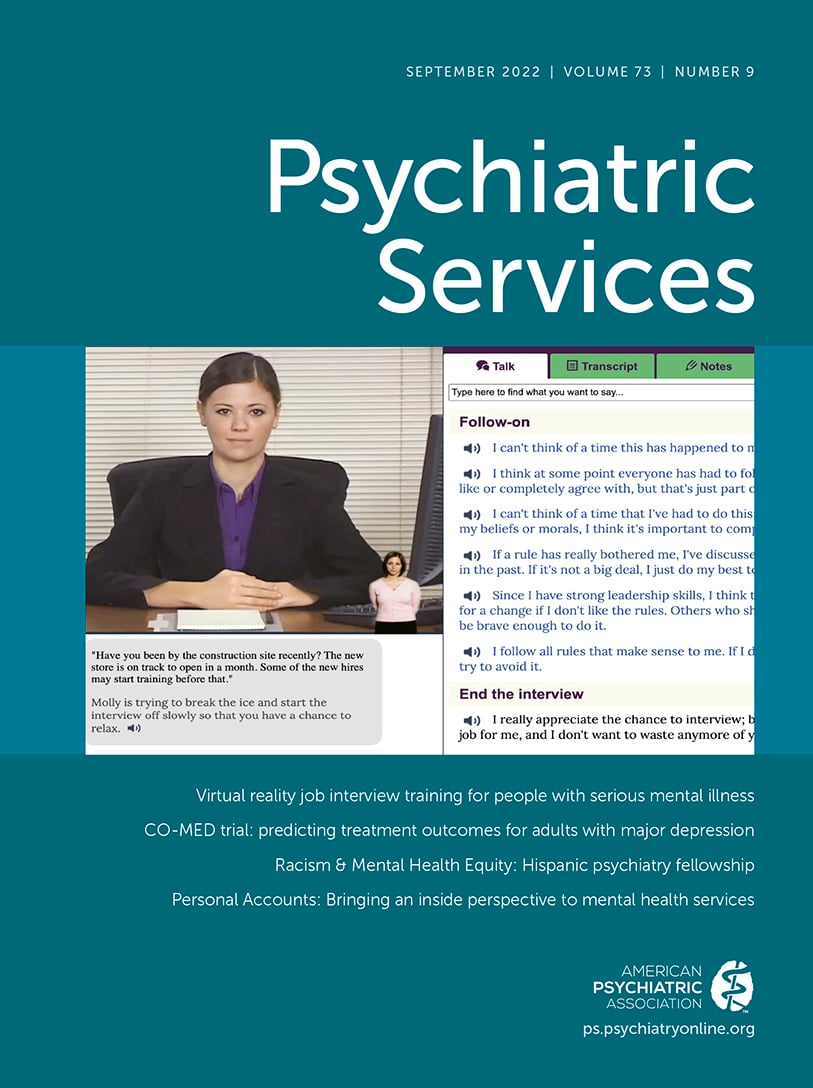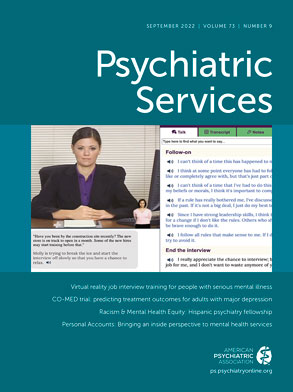Hispanics represent 18.7% (60.6 million) of the U.S. population (
1), with numbers likely to double within the next four decades. With this population growth, the scarcity of bilingual (English-Spanish) psychiatrists and culturally appropriate mental health services for this minority population, which includes individuals with limited English proficiency (LEP), represents a national public health concern (
2). Attaining optimal-quality health care for LEP Hispanic populations is challenging, because there are not enough providers who understand their values and acknowledge the discrimination and challenges of a racialized society. For this column, we use the term “Hispanic” to identify someone born in a Spanish-speaking country, Spanish speaking, born to a Spanish speaker, or descended from someone born in a Spanish-speaking country. Other terms used for this population, such as “Latino/a/x,” are also used interchangeably to refer to individuals from Latin America, including those identifying as nonbinary (
3).
Social and structural determinants of health shape life conditions contributing to inequitable health outcomes. The U.S. Hispanic population experiences additional determinants, such as immigration status, cultural differences, racism, and language limitations, which compound behavioral health care challenges. The National Health Care Quality and Disparities Report on Hispanics has documented unchanged rates for medical coverage, access to care, and health outcomes from 2000 to 2017 (
4). Thus, the search for solutions to provide appropriate services to address specific patient needs and preferences continues. Training programs addressing the scarcity of bilingual mental health professionals from minority populations (
5) may help lead to a diverse workforce in senior academic and leadership positions (
6).
We aimed to maximize appropriate mental health services for Hispanic populations with LEP by building a specialized educational program to train psychiatrists to become leaders and advocates. A specialized Hispanic Psychiatry Fellowship program was proposed by two leaders (E.D., C.D.) who identified the scarcity of Spanish-speaking psychiatrists in the state of Connecticut as a prime contributor to disparities in behavioral health services. The proposal to address these critical gaps through formal training led to the funding of this fellowship. This column describes the development and first 2 years of the fellowship’s operation: July 1, 2019, to June 30, 2021. Our findings focused on development, implementation, feasibility indicators, and suggestions to adapt the model for other contexts.
Methods
Institutional review board (IRB) approval was waived for this project. Below we describe our initial considerations for the fellowship: choosing a clinic model serving an LEP Hispanic population as a training site; identifying core training themes to fit the needs of the patient population; selecting interested faculty experts; and developing educational goals, objectives, and evaluations.
Clinical Model as Training Site
The Hispanic Clinic of the Connecticut Mental Health Center has been a state-owned and -operated academic community program since 1972 and has become a model for using Hispanic values in services development targeting stigma, language, cultural constructs, and acculturation. The model addresses several social determinants of health: LEP, immigration status, and access to care. Educational programs for bilingual trainees from multiple disciplines have flourished in this environment, including a cultural psychiatry curriculum focused on social justice and health equity (
7).
The clinic serves an LEP Hispanic population of approximately 300 individuals in New Haven, a city where 31.2% of the population originates from Puerto Rico, Mexico, and Central and South America. Additionally, the Latino Behavioral Health System, a community expansion of the clinic, cares for another 400 individuals. Services are provided by an interdisciplinary staff composed of licensed bilingual (Spanish-English) professionals from Hispanic groups. Referrals are facilitated by telephone, and walk-in visits are conducted in Spanish. Funding for those who are uninsured comes from the academic-state affiliation and includes coverage for psychotropic medications as needed.
Development of Core Training Themes
The Hispanic Psychiatry Fellowship, part of Yale’s Department of Psychiatry, offers 1 year of training focused on providing behavioral health services to LEP Hispanics. The fellowship aims to attract bilingual Spanish-English psychiatrists who can provide culturally sensitive and recovery-oriented care while learning the clinic model strategies and becoming leaders in Hispanic psychiatry. Hispanic candidates are preferred. Candidates are graduated psychiatrists or are in an advanced stage of psychiatric training and licensed to practice medicine. Fifty percent of effort is spent providing direct clinical services to LEP Hispanics; the remaining 50% is spent on academic activities related to the core training framework. Scholarly projects are encouraged. The fellow meets monthly with assigned faculty experts for each core training area: policy and leadership, cultural psychiatry (
8), evidence-based psychiatric care for Hispanics, recovery, forensics (
9), substance use (
10), and education (
11). (See the
online supplement: Core Training Descriptions and Timeline.)
Identification of Interested Faculty Experts
Within the academic-state affiliation, faculty with expertise in the above core training areas agreed to participate in the fellowship program as part of their appointment. Each faculty mentor addresses one core theme when meeting with the fellow at least monthly. A cultural psychiatry expert (F.G.L.) from another institution provides additional support and a national perspective. Clinic leaders meet weekly with the fellow to provide overall support in developing a leadership role.
Development and Evaluation of Educational Goals and Objectives
As educational goals and objectives were identified, midyear and year-end evaluations were constructed, consisting of questionnaires containing Likert scale responses and space for narrative comments. The fellow is provided with access to the evaluations. Faculty provide feedback on the trainee and the program with opportunity to discuss progress with the fellow and with the fellowship director for periodic review and potential changes.
Results
A year-long training experience for two consecutive fellows was implemented based on the plan (see activities outline in the
online supplement). A third fellow is currently in training. The fellows, under the ethnically diverse leadership and staff, have become familiar with serving monolingual Spanish-speaking patients within the established bilingual clinic model. Additionally, the fellows have provided direct clinical services and consultation for public psychiatry mental health settings that previously had only limited access to bilingual psychiatrists. The fellows have engaged in their monthly schedule of individual expert supervision. The evaluations have indicated the experience is feasible and satisfactory and have captured positive outcomes for each core training area.
Within the ≥2 years the fellowship has been operating, several scholarly projects developed, including exploration of culturally sensitive recovery interventions for Hispanics with serious mental illness. An IRB-approved pilot project elicited and identified information regarding the meaning of recovery for Hispanics to transform the Citizenship project (
12), an evidence-based recovery intervention for the general population, in a culturally sensitive manner. The results of these projects were presented at the 2020 Society for the Study of Psychiatry and Culture Annual Conference. One fellow’s case review of a person whose symptoms were misinterpreted as cultural beliefs won the John P. Spiegel Memorial Fellowship Award for an original cultural psychiatry article addressing cultural and religious beliefs of a Hispanic woman. A virtual conference was delivered for mental health professionals and community agencies, highlighting care for immigrants and children and a call to action. The fellow’s active participation in recruiting from ethnic minority groups for psychiatry educational programs supported other diversity initiatives.
Structured opportunities to develop educational expertise have included direct teaching and mentorship of other graduate students. The fellows have led the clinic’s curriculum addressing bias, health disparities, recovery-oriented services, interviewing skills, and mental health services for ethnic minority groups. They also have led seminars for medical students working in a primary care student-run free clinic serving minority populations.
Overall, during the first 2 operating years, the Hispanic Psychiatry Fellowship met its established goals and demonstrated feasibility. Implementation was possible because of sufficient political and financial support, resources, and well-matched administrative strategies.
Discussion and Future Directions
One fellow per year does not provide sufficient data to evaluate outcomes; however, the fellowship experience catalyzed several scholarly projects, with products presented nationally. On completion of the program, the first two fellows applied for and were granted faculty appointments at our academic medical center, thus contributing to diversity in the workforce. Having future fellows disseminate this model to other sites is an additional goal.
The development of a fellowship dedicated to training bilingual Hispanic psychiatrists to securing appropriate services for an LEP Spanish-speaking population is a great beginning; however, it remains a beginning. The lack of recognition regarding the consequences of the scarcity of bilingual mental health professionals was addressed locally through the academic-state affiliation, but many barriers impede starting such programs elsewhere. Those interested in developing a similar program will need to identify which sites and services could become part of a similar model for prospective trainees, secure a support group to identify the service and educational needs, and develop a plan. Alternatively, public psychiatry fellowships can consider creating a specialized mental health services track for serving LEP ethnic minority populations.
Nationally, budgets do not prioritize LEP ethnic minority populations in need of mental health services. Funding our initial budget request was challenging. Many states support mental health services for their populations, including psychiatry training programs, and possess academic-state partnerships. The connections and collaborations with state leaders who understood the unique population needs and who were familiar with the challenges ethnic minority populations face facilitated advocacy and were crucial.
Careful preparation with multiple stakeholders, including academic faculty, organizational leadership, and state officials, was needed to develop an adequate training plan. Core training areas based on the unique needs of the LEP ethnic minority population were identified and served as a curriculum needs assessment. Learning to use existing resources and connect with experts to develop a solid plan are replicable strategies. Our initiative successfully engaged a nationally recognized expert. Recruiting such an expert to a developing training program was feasible and is replicable.
Educational and leadership opportunities for bilingual individuals from racial-ethnic minority groups are limited across health care disciplines. Leaders and advocates can develop educational plans to attract minority populations by using their own faculty or by inviting interested experts from other institutions.
Training in a program that confronts and addresses the social norms that propagate and prolong racist policies is transformative. The creation of such an environment is within the purview of clinician leaders and advocates. Witnessing a community unite to protect the underserved is an important educational experience for trainees.
The Hispanic Psychiatry Fellowship maximizes the impact of bilingual Spanish-English psychiatrists and can disseminate a model that extends to other LEP minority populations, addressing service and workplace scarcity. The experience empowers bilingual psychiatrists to become knowledgeable leaders regarding policy, health disparities, and racism, while developing skills to teach the cultural aspects of ethnic minority diversity, including training others to do the same. Access to virtual patient care and electronic learning modules may help expand and facilitate programming. Further data are needed to assess the outcomes of this program.
Conclusions
The Hispanic Psychiatry Fellowship is a new training model engaging bilingual psychiatrists from a racial-ethnic minority group. The effort is an innovative strategy meant to dismantle racism in education and training. The first 2 years of training activities demonstrated feasibility, ease of implementation, and overall acceptance. Similar programs can be developed by uniting clinicians and educators interested in addressing racism and health equity, thereby maximizing services for minority populations and eventually increasing workforce diversity.
Graduates of such programs can build and expand their careers by teaching as academic psychiatrists and by leading culturally responsive mental health services in nonacademic settings. Most important, they can broaden access to high-quality care for LEP individuals. Additionally, while transforming systems into those capable of offering just and equal care for underserved populations, graduates can recruit the next generation of students, trainees, and ultimately leaders.
Acknowledgments
The authors thank Selby Jacobs, Robert Rohrbaugh, and David A. Ross for their comments on the manuscript. These views represent the opinions of the authors and not necessarily those of the DMHAS or the State of Connecticut.

